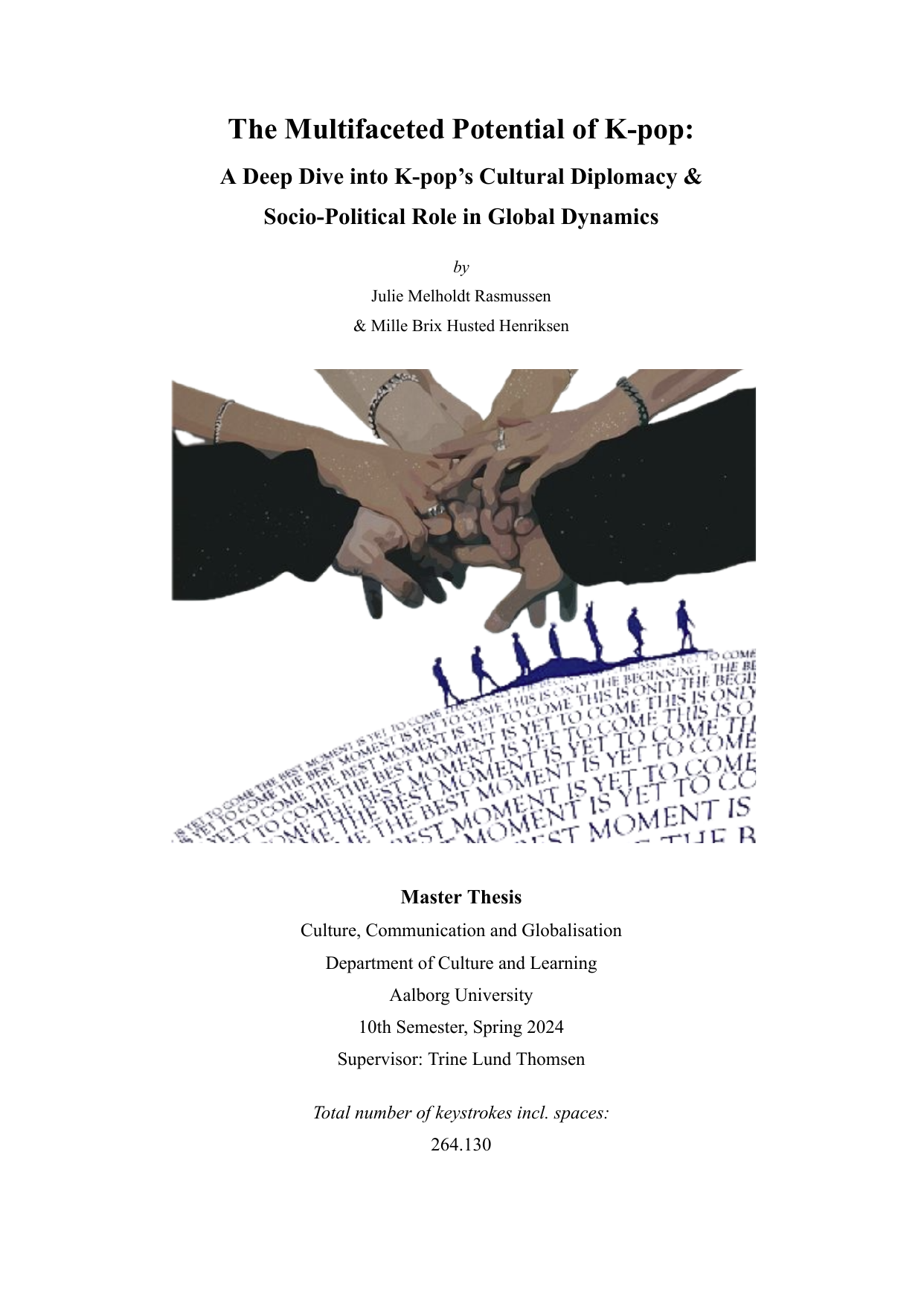
The Multifaceted Potential of K-pop: A Deep Dive into K-pop's Cultural Diplomacy & Socio-Political Role in Global Dynamics
Translated title
The Multifaceted Potential of K-pop : A Deep Dive into K-pop's Cultural Diplomacy & Socio-Political Role in Global Dynamics
Term
4. term
Publication year
2024
Submitted on
2024-05-29
Pages
122
Abstract
This Master thesis investigates the contribution of K-pop’s global influence in South Korea’s soft power objectives and cultural diplomacy efforts, as well as examining the K-pop industry’s engagement in global socio-political issues. Grounded in the theories of soft power and cultural diplomacy, complemented by concepts within critical feminist studies, this thesis provides a historical insight into South Korea’s spread of Hallyu, the spread of its cultural waves globally, and explores the embedded cultural, economic, and socio-political implications leading to the formation of the global phenomenon of the multifaceted K-pop industry. Incorporating qualitative and empirical data from 13 semi-structured interviews of K-pop fans, K-pop industry employee, NGO employees, and experts within international relations, the thesis demonstrates that K-pop serves as an integral soft power resource for South Korea and that the K-pop industry actively participates in socio-political advocacy. The thesis indicates that K-pop significantly enhances and influences South Korea’s diplomatic engagements, improving bi– and multilateral relations within the international community. Furthermore, the K-pop industry engages in both positive and negative forms of activism and advocacy, addressing global socio-political issues such as gender dynamics, social justice, climate change, and cultural pressures. The thesis demonstrates that technological advancements and social media platforms facilitate the K-pop industry’s engagement, which empower non-state actors, civil society, and K-pop fandoms to mobilise and drive social movements globally. Despite these contributions, the findings highlight the limitations and challenges that are associated with the role of K-pop idols as diplomats and activists, which delves into the suitability of idols as social advocates. The internal constraints of the South Korean entertainment industry and external political tensions contribute to hindering the effectiveness of K-pop’s potential as a soft power resource in global contexts. Nonetheless, the thesis concludes that K-pop idols and their international fandoms possess considerable influence to change perceptions and advocate for socio-political causes that emphasises the complex nature between popular culture, soft power, and global activism. This thesis contributes to the academic discourse by providing a comprehensive analysis and discussion of K-pop’s socio-political dimensions and its role in contemporary international relations, offering new insights into the strategic significance of popular culture in shaping global narratives and fostering cross-cultural exchanges.
This Master thesis investigates the contribution of K-pop’s global influence in South Korea’s soft power objectives and cultural diplomacy efforts, as well as examining the K-pop industry’s engagement in global socio-political issues. Grounded in the theories of soft power and cultural diplomacy, complemented by concepts within critical feminist studies, this thesis provides a historical insight into South Korea’s spread of Hallyu, the spread of its cultural waves globally, and explores the embedded cultural, economic, and socio-political implications leading to the formation of the global phenomenon of the multifaceted K-pop industry. Incorporating qualitative and empirical data from 13 semi-structured interviews of K-pop fans, K-pop industry employee, NGO employees, and experts within international relations, the thesis demonstrates that K-pop serves as an integral soft power resource for South Korea and that the K-pop industry actively participates in socio-political advocacy. The thesis indicates that K-pop significantly enhances and influences South Korea’s diplomatic engagements, improving bi– and multilateral relations within the international community. Furthermore, the K-pop industry engages in both positive and negative forms of activism and advocacy, addressing global socio-political issues such as gender dynamics, social justice, climate change, and cultural pressures. The thesis demonstrates that technological advancements and social media platforms facilitate the K-pop industry’s engagement, which empower non-state actors, civil society, and K-pop fandoms to mobilise and drive social movements globally. Despite these contributions, the findings highlight the limitations and challenges that are associated with the role of K-pop idols as diplomats and activists, which delves into the suitability of idols as social advocates. The internal constraints of the South Korean entertainment industry and external political tensions contribute to hindering the effectiveness of K-pop’s potential as a soft power resource in global contexts. Nonetheless, the thesis concludes that K-pop idols and their international fandoms possess considerable influence to change perceptions and advocate for socio-political causes that emphasises the complex nature between popular culture, soft power, and global activism. This thesis contributes to the academic discourse by providing a comprehensive analysis and discussion of K-pop’s socio-political dimensions and its role in contemporary international relations, offering new insights into the strategic significance of popular culture in shaping global narratives and fostering cross-cultural exchanges.
Keywords
K-pop ; cultural diplomacy ; soft power ; socio-political issues ; South Korea ; fan activism ; gender dynamics ; feminist critical studies ; censorship ; artivism ; North Korea ; K-pop activism ; K-diplomacy ; Hallyu ; Korean wave ; cultural pressures ; heteronormativity ; co-optation ; patriarchy ; intersectionality ; post-structural feminism ; South Korean culture
Documents
